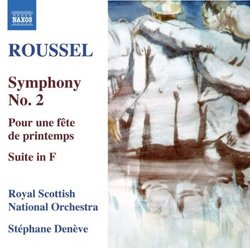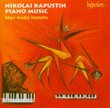| All Artists: Roussel, Deneve, Royal Scottish National Orchestra Title: Roussel: Symphony No. 2; Pour une fête de printemps; Suite in F Members Wishing: 0 Total Copies: 0 Label: Naxos Original Release Date: 1/1/2008 Re-Release Date: 4/29/2008 Genre: Classical Style: Symphonies Number of Discs: 1 SwapaCD Credits: 1 UPC: 747313052974 |
Search - Roussel, Deneve, Royal Scottish National Orchestra :: Roussel: Symphony No. 2; Pour une fête de printemps; Suite in F
 | Roussel, Deneve, Royal Scottish National Orchestra Roussel: Symphony No. 2; Pour une fête de printemps; Suite in F Genre: Classical
|
Larger Image |
CD DetailsSimilar CDs |
CD ReviewsThe Glorious Byways of Roussel Micromegas | Ada, OK | 06/05/2008 (5 out of 5 stars) "Roussel is relatively little played as it is, known primarily for his 3rd and 4th symphonies, and of course his ballet Bacchus et Ariane (the second suite, anyway). Upon fuller acquaintance, he emerges as a masterful composer who straddles the impressionism of Debussy and Ravel to the neoclassicism of Stravinsky and Martinu (the latter of whom was his student, so maybe it's the other way around). This brilliant disc--honestly, it's totally first-rate--captures him at two periods: his earlier impressionistic phase and with one piece, the Suite in F, his brilliant, concise version of neoclassicism.
My favorite piece is the Suite in F, which I also have in Paray's famous recording (coupled with Chabrier's orchestral works with the Detroit SO). It's a brilliant, endlessly inventive piece with jaw-dropping orchestration. It begins with a tumultuous, driving theme (rather charming, though) that becomes more and more menacing as it reaches its climax. A more heroic, jaunty version of this theme appears soon after, and the movement veers between maniacal high spirits to something more alarming. The slow movement opens up with a stark theme, played very low, which gradually assumes force--eventually being blasted by the orchestra. A jaunty finale concludes the piece, with all the characteristics of the above movements, but ending on a slightly more affirmative note. I think this is a masterpiece of 20th c. orchestral music, and considering its short time, it could easily be plugged into many concert performances. The Royal Scottish NO under the direction Deneve balances the piece's personality disorder marvelously, at once light and then barbarically forceful. I enjoy this performance more than the Paray, especially as it has more spascious sound. The Second Symphony is a major work, quite impressionistic in layout, and with very sensitive, glowing orchestration. Yet it simmers with anger and drama at times, and takes the listener on a very expansive and exciting journey. Its a very subtle piece that impresses on first listening, but reveals endless depths as you come back to it--much more so, perhaps, than his two later symphonies (which are more direct, if more powerful). The title "Pour une fete de printempts" sounds like Debussy, and there is something of that master's touch, though this is distinctly Roussel's impressionism. It's a marvelous piece, again very atmospheric, which opens up a hidden world--endlessly fun to explore. This is an exciting series of Roussel's orchestral music, and I anxiously await Deneve's recording of Symphony No.1, and hopefully, the ballet The Spider's Feast. Highly recommended even if you have the Paray Suite or an alternative version of Symphony No.2." |

 Track Listings (7) - Disc #1
Track Listings (7) - Disc #1

